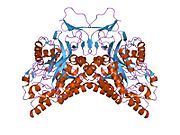CRMP1
Appearance
(Redirected from CRMP1 (gene))
| CRMP1 | |||||||||||||||||||||||||||||||||||||||||||||||||||
|---|---|---|---|---|---|---|---|---|---|---|---|---|---|---|---|---|---|---|---|---|---|---|---|---|---|---|---|---|---|---|---|---|---|---|---|---|---|---|---|---|---|---|---|---|---|---|---|---|---|---|---|
 | |||||||||||||||||||||||||||||||||||||||||||||||||||
| |||||||||||||||||||||||||||||||||||||||||||||||||||
| Identifiers | |||||||||||||||||||||||||||||||||||||||||||||||||||
| Aliases | CRMP1, CRMP-1, DPYSL1, DRP-1, DRP1, ULIP-3, collapsin response mediator protein 1 | ||||||||||||||||||||||||||||||||||||||||||||||||||
| External IDs | OMIM: 602462; MGI: 107793; HomoloGene: 20347; GeneCards: CRMP1; OMA:CRMP1 - orthologs | ||||||||||||||||||||||||||||||||||||||||||||||||||
| |||||||||||||||||||||||||||||||||||||||||||||||||||
| |||||||||||||||||||||||||||||||||||||||||||||||||||
| |||||||||||||||||||||||||||||||||||||||||||||||||||
| |||||||||||||||||||||||||||||||||||||||||||||||||||
| |||||||||||||||||||||||||||||||||||||||||||||||||||
| Wikidata | |||||||||||||||||||||||||||||||||||||||||||||||||||
| |||||||||||||||||||||||||||||||||||||||||||||||||||
Collapsin response mediator protein 1, encoded by the CRMP1 gene, is a human protein of the CRMP family.[5]
This gene encodes a member of a family of cytosolic phosphoproteins expressed exclusively in the nervous system. The encoded protein is thought to be a part of the semaphorin signal transduction pathway implicated in semaphorin-induced growth cone collapse during neural development. Alternative splicing results in multiple transcript variants.[5]
CRMP1 mediates reelin signaling in cortical neuronal migration.[6] Mice deficient in CRMP1 exhibit impaired long-term potentiation and impaired spatial learning and memory.[7]
CRMP1 gene overlaps with another gene called EVC.[8]
Interactions
[edit]CRMP1 has been shown to interact with DPYSL2.[9]
References
[edit]- ^ a b c GRCh38: Ensembl release 89: ENSG00000072832 – Ensembl, May 2017
- ^ a b c GRCm38: Ensembl release 89: ENSMUSG00000029121 – Ensembl, May 2017
- ^ "Human PubMed Reference:". National Center for Biotechnology Information, U.S. National Library of Medicine.
- ^ "Mouse PubMed Reference:". National Center for Biotechnology Information, U.S. National Library of Medicine.
- ^ a b "Entrez Gene: CRMP1 collapsin response mediator protein 1".
- ^ Yamashita N, Uchida Y, Ohshima T, Hirai S, Nakamura F, Taniguchi M, Mikoshiba K, Honnorat J, Kolattukudy P, Thomasset N, Takei K, Takahashi T, Goshima Y (December 2006). "Collapsin response mediator protein 1 mediates reelin signaling in cortical neuronal migration". J. Neurosci. 26 (51): 13357–62. doi:10.1523/JNEUROSCI.4276-06.2006. PMC 6674993. PMID 17182786.
- ^ Su KY, Chien WL, Fu WM, Yu IS, Huang HP, Huang PH, Lin SR, Shih JY, Lin YL, Hsueh YP, Yang PC, Lin SW (March 2007). "Mice deficient in collapsin response mediator protein-1 exhibit impaired long-term potentiation and impaired spatial learning and memory". J. Neurosci. 27 (10): 2513–24. doi:10.1523/JNEUROSCI.4497-06.2007. PMC 6672508. PMID 17344389.
- ^ Ruiz-Perez VL, Ide SE, Strom TM, Lorenz B, Wilson D, Woods K, King L, Francomano C, Freisinger P, Spranger S, Marino B, Dallapiccola B, Wright M, Meitinger T, Polymeropoulos MH, Goodship J (March 2000). "Mutations in a new gene in Ellis-van Creveld syndrome and Weyers acrodental dysostosis". Nat. Genet. 24 (3): 283–6. doi:10.1038/73508. PMID 10700184. S2CID 1391136.
- ^ Leung, Thomas; Ng Yvonne; Cheong Albert; Ng Chong Han; Tan Ivan; Hall Christine; Lim Louis (Dec 2002). "p80 ROKalpha binding protein is a novel splice variant of CRMP-1 which associates with CRMP-2 and modulates RhoA-induced neuronal morphology". FEBS Lett. 532 (3): 445–9. doi:10.1016/S0014-5793(02)03736-5. ISSN 0014-5793. PMID 12482610. S2CID 45499981.
External links
[edit]- Human CRMP1 genome location and CRMP1 gene details page in the UCSC Genome Browser.
Further reading
[edit]- Shih JY, Lee YC, Yang SC, et al. (2003). "Collapsin response mediator protein-1: a novel invasion-suppressor gene". Clin. Exp. Metastasis. 20 (1): 69–76. doi:10.1023/A:1022598604565. PMID 12650609. S2CID 25005489.
- Hamajima N, Matsuda K, Sakata S, et al. (1997). "A novel gene family defined by human dihydropyrimidinase and three related proteins with differential tissue distribution". Gene. 180 (1–2): 157–63. doi:10.1016/S0378-1119(96)00445-3. PMID 8973361.
- Torres R, Polymeropoulos MH (1999). "Genomic organization and localization of the human CRMP-1 gene". DNA Res. 5 (6): 393–5. doi:10.1093/dnares/5.6.393. PMID 10048489.
- Shih JY, Yang SC, Hong TM, et al. (2001). "Collapsin response mediator protein-1 and the invasion and metastasis of cancer cells". J. Natl. Cancer Inst. 93 (18): 1392–400. doi:10.1093/jnci/93.18.1392. PMID 11562390.
- Strausberg RL, Feingold EA, Grouse LH, et al. (2003). "Generation and initial analysis of more than 15,000 full-length human and mouse cDNA sequences". Proc. Natl. Acad. Sci. U.S.A. 99 (26): 16899–903. Bibcode:2002PNAS...9916899M. doi:10.1073/pnas.242603899. PMC 139241. PMID 12477932.
- Leung T, Ng Y, Cheong A, et al. (2003). "p80 ROKalpha binding protein is a novel splice variant of CRMP-1 which associates with CRMP-2 and modulates RhoA-induced neuronal morphology". FEBS Lett. 532 (3): 445–9. doi:10.1016/S0014-5793(02)03736-5. PMID 12482610. S2CID 45499981.
- Ota T, Suzuki Y, Nishikawa T, et al. (2004). "Complete sequencing and characterization of 21,243 full-length human cDNAs". Nat. Genet. 36 (1): 40–5. doi:10.1038/ng1285. PMID 14702039.
- Chang CC, Shih JY, Jeng YM, et al. (2004). "Connective tissue growth factor and its role in lung adenocarcinoma invasion and metastasis". J. Natl. Cancer Inst. 96 (5): 364–75. doi:10.1093/jnci/djh059. PMID 14996858.
- Ballif BA, Villén J, Beausoleil SA, et al. (2005). "Phosphoproteomic analysis of the developing mouse brain". Mol. Cell. Proteomics. 3 (11): 1093–101. doi:10.1074/mcp.M400085-MCP200. PMID 15345747.
- Goehler H, Lalowski M, Stelzl U, et al. (2004). "A protein interaction network links GIT1, an enhancer of huntingtin aggregation, to Huntington's disease". Mol. Cell. 15 (6): 853–65. doi:10.1016/j.molcel.2004.09.016. PMID 15383276.
- Gerhard DS, Wagner L, Feingold EA, et al. (2004). "The Status, Quality, and Expansion of the NIH Full-Length cDNA Project: The Mammalian Gene Collection (MGC)". Genome Res. 14 (10B): 2121–7. doi:10.1101/gr.2596504. PMC 528928. PMID 15489334.
- Sivakumaran TA, Lesperance MM (2005). "Haplotype and linkage disequilibrium analysis of the CRMP1 and EVC genes". Int. J. Mol. Med. 14 (5): 903–7. doi:10.3892/ijmm.14.5.903. PMID 15492864.
- Stelzl U, Worm U, Lalowski M, et al. (2005). "A human protein-protein interaction network: a resource for annotating the proteome". Cell. 122 (6): 957–68. doi:10.1016/j.cell.2005.08.029. hdl:11858/00-001M-0000-0010-8592-0. PMID 16169070. S2CID 8235923.
- Cole AR, Causeret F, Yadirgi G, et al. (2006). "Distinct Priming Kinases Contribute to Differential Regulation of Collapsin Response Mediator Proteins by Glycogen Synthase Kinase-3 in Vivo". J. Biol. Chem. 281 (24): 16591–8. doi:10.1074/jbc.M513344200. PMC 1805471. PMID 16611631.
- Weidemann W, Stelzl U, Lisewski U, et al. (2007). "The collapsin response mediator protein 1 (CRMP-1) and the promyelocytic leukemia zinc finger protein (PLZF) bind to UDP-N-acetylglucosamine 2-epimerase/N-acetylmannosamine kinase (GNE), the key enzyme of sialic acid biosynthesis". FEBS Lett. 580 (28–29): 6649–54. doi:10.1016/j.febslet.2006.11.015. PMID 17118363. S2CID 25369336.






